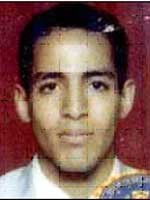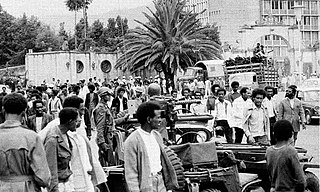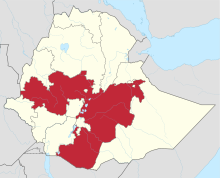
The Ethiopian National Defense Force (ENDF) is the combined military force of Ethiopia. ENDF is consisted of 10 command forces which is controlled by the Chief of General Staff.

Mengistu Haile Mariam is an Ethiopian former politician, revolutionary and former military officer who was the head of state of Ethiopia from 1977 to 1991 and General Secretary of the Workers' Party of Ethiopia from 1984 to 1991. He was the chairman of the Derg, the Marxist-Leninist military junta that governed Ethiopia, from 1977 to 1987, and the president of the People's Democratic Republic of Ethiopia (PDRE) from 1987 to 1991.

The Derg, officially the Provisional Military Administrative Council (PMAC), was the Ethiopian state that existed from 1974 to 1987 military dictatorship which then including present-day Eritrea, when the military junta formally "civilianized" the administration but stayed in power until 1991.

Abdullahi Yusuf Ahmed was a Somali politician and former military officer. He was one of the founders of the rebel Somali Salvation Democratic Front (SSDF), as well as the Puntland state of Somalia, the latter of which he served as the first president. In 2004, Yusuf also helped establish the Transitional Federal Government (TFG), which he led as President of Somalia from 2004 until 2008.

Dire Dawa is a city in eastern Ethiopia near the Somali Region and Oromo border and one of two chartered cities in Ethiopia. Dire Dawa alongside present-day Sitti Zone were a part of the Dire Dawa autonomous region of the Somali Region stipulated in the 1987 Ethiopian Constitution until 1993 when it was split by the federal government into a separately administered chartered city.

Saleh Ali Saleh Nabhan also known as Abu Yusuf, was an operative of al-Qaeda in Somalia. He was listed on the FBI's third major "wanted" list, the FBI Seeking Information – War on Terrorism list, for his association with multiple attacks in Kenya in 2002, as well as his possible involvement in the 1998 United States embassy bombings, in which over 250 people lost their lives.
Negele Borana is a town and separate woreda in southern Ethiopia. Located on the road connecting Addis Ababa to Moyale, it is the capital of the newly-established East Borana Zone of the Oromia Region. Negelle Borana is the largest city traditionally inhabited by the Borana Oromo. It has a latitude and longitude of 5°20′N39°35′E with an altitude of about 1,475 meters above sea level. It is surrounded by Liben woreda.

The Ethiopian Civil War was a civil war in Ethiopia and present-day Eritrea, fought between the Ethiopian military junta known as the Derg and Ethiopian-Eritrean anti-government rebels from 12 September 1974 to 28 May 1991.

The African Union Mission in Somalia (AMISOM) was a Multinational force formed by the African Union. The operation deployed to Somalia soon after the Islamic Courts Union was deposed by troops from Ethiopia during a large scale invasion in late 2006. The missions primary objective was to maintain the regime change between the ICU and the newly installed Transitional Federal Government, implement a national security plan and train the TFG security forces. As part of its duties, AMISOM later supported the Federal Government of Somalia in its war against Al-Shabaab. AMISOM was the most deadly peacekeeping operation in the post-war era.
Afder is one of the woredas in the Somali Region of Ethiopia. Part of the Afder Zone, Afder is bordered on the south by Dolobay, on the west by Jerti (woreda)Jarreti, on the north by Elkere, on the west by the Gode Zone, and on the southeast by Barrey. Towns in Afder include Gud'usbo and Hargele.

The Ethiopian Air Force (ETAF) is the air service branch of the Ethiopian National Defence Force. The ETAF is tasked with protecting the national air space, providing support to ground forces, as well as assisting civil operations during war.

The fall of Mogadishu occurred on 28 December 2006, when the Ethiopian National Defence Forces (ENDF) advanced into the capital to install the Transitional Federal Government (TFG). The Islamic Courts Union (ICU), which had controlled the capital since June 2006, withdrew from the city after a week of fighting ENDF/TFG forces in southern and central Somalia.

The timeline of events in the War in Somalia during 2007 is set out below.

The Battle of Ganale Doria took place in 1936 during the Second Italo-Abyssinian War. It was fought on the "southern front". The battle consisted largely of air attacks by the Italian Royal Air Force, under the command of General Rodolfo Graziani, against an advancing and then withdrawing Ethiopian army under Ras Desta Damtu. The battle was primarily fought in the area along the Genale Doria River valley between Dolo and Negele Boran.

The Somali Civil War (2009–present) is the ongoing phase of the Somali Civil War which is concentrated in southern and central Somalia. It began in late January 2009 with the present conflict mainly between the forces of the Federal Government of Somalia assisted by African Union peacekeeping troops and al-Shabaab militants who pledged allegiance to al-Qaeda during 2012.
Filtu is the capital city of '"Liben Zone"' Filtu is a town in southern Ethiopia. Located in the Liben Zone of the Somali Region, it has a latitude and longitude of 4°58′N40°23′E with an elevation of 1252 meters above sea level. It is the administrative center of Filtu woreda. During the Italian occupation, a road 115 kilometers in length to Negele Boran was maintained but not paved.

This is a 2013 timeline of events in the Somali Civil War (2009–present).

This is a 2010 timeline of events in the Somali Civil War (2009–present).

The fallof the Derg was a military campaign that resulted in the defeat of the ruling Marxist–Leninist military junta, the Derg, by the rebel coalition Ethiopian People's Revolutionary Democratic Front (EPRDF) on 28 May 1991 in Addis Ababa, ending the Ethiopian Civil War. The Derg took power after deposing Emperor Haile Selassie and the Solomonic dynasty, an imperial dynasty of Ethiopia that began in 1270. The Derg suffered from insurgency with different factions, and separatist rebel groups since their early rule, beginning with the Ethiopian Civil War. The 1983–1985 famine, the Red Terror, and resettlement and villagization made the Derg unpopular with the majority of Ethiopians tending to support insurgent groups like the Tigray People's Liberation Front (TPLF) and Eritrean People's Liberation Front (EPLF).
The 1995 Ethiopian Federal Constitution formalizes an ethnic federalism law aimed at undermining long-standing ethnic imperial rule, reducing ethnic tensions, promoting regional autonomy, and upholding unqualified rights to self-determination and secession in a state with more than 80 different ethnic groups. But the constitution is divisive, both among Ethiopian nationalists who believe it undermines centralized authority and fuels interethnic conflict, and among ethnic federalists who fear that the development of its vague components could lead to authoritarian centralization or even the maintenance of minority ethnic hegemony. Parliamentary elections since 1995 have taken place every five years since enactment. All but one of these have resulted in government by members of the Ethiopian People's Revolutionary Democratic Front (EPRDF) political coalition, under three prime ministers. The EPRDF was under the effective control of the Tigray People's Liberation Front (TPLF), which represents a small ethnic minority. In 2019 the EPRDF, under Abiy, was dissolved and he inaugurated the pan-ethnic Prosperity Party which won the 2021 Ethiopian Election, returning him as prime minister. But both political entities were different kinds of responses to the ongoing tension between constitutional ethnic federalism and the Ethiopian state's authority. Over the same period, and all administrations, a range of major conflicts with ethnic roots have occurred or continued, and the press and availability of information have been controlled. There has also been dramatic economic growth and liberalization, which has itself been attributed to, and used to justify, authoritarian state policy.















